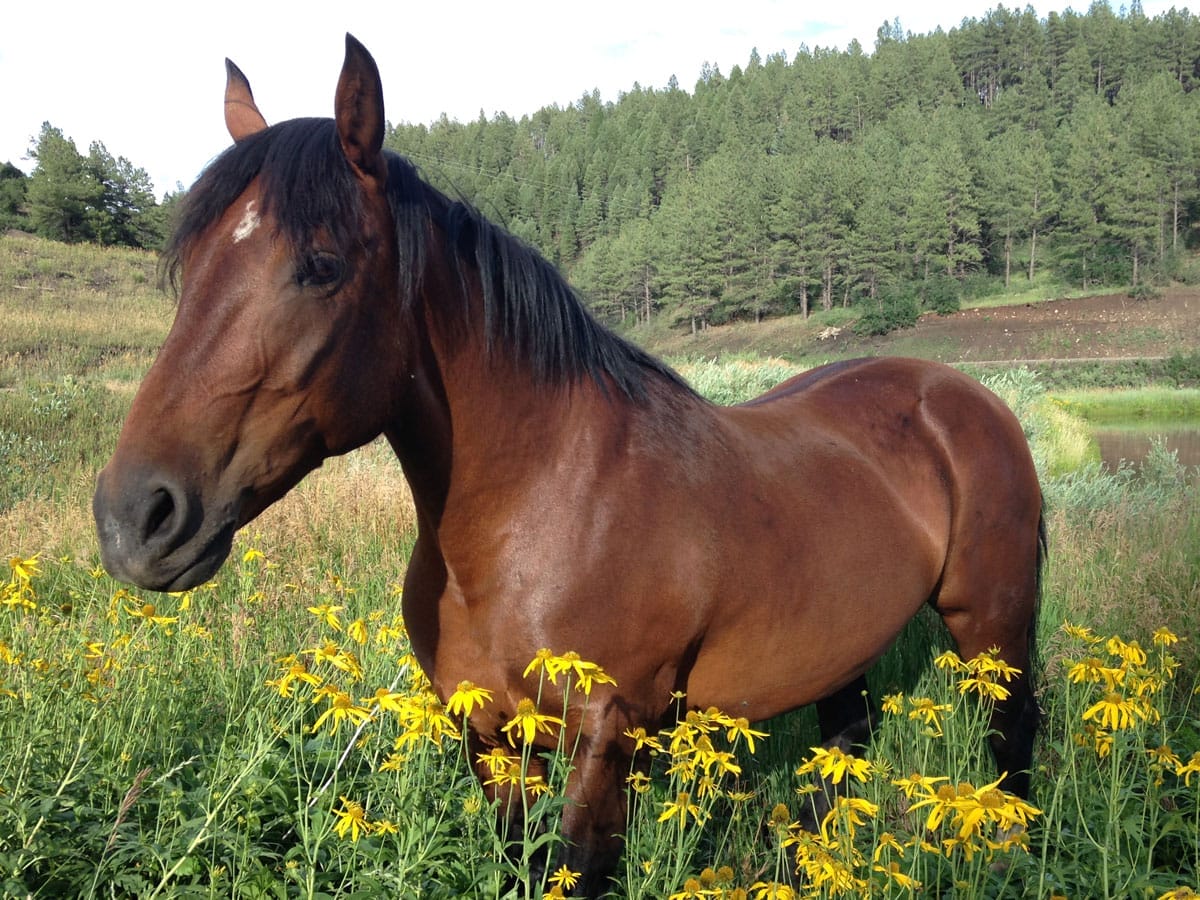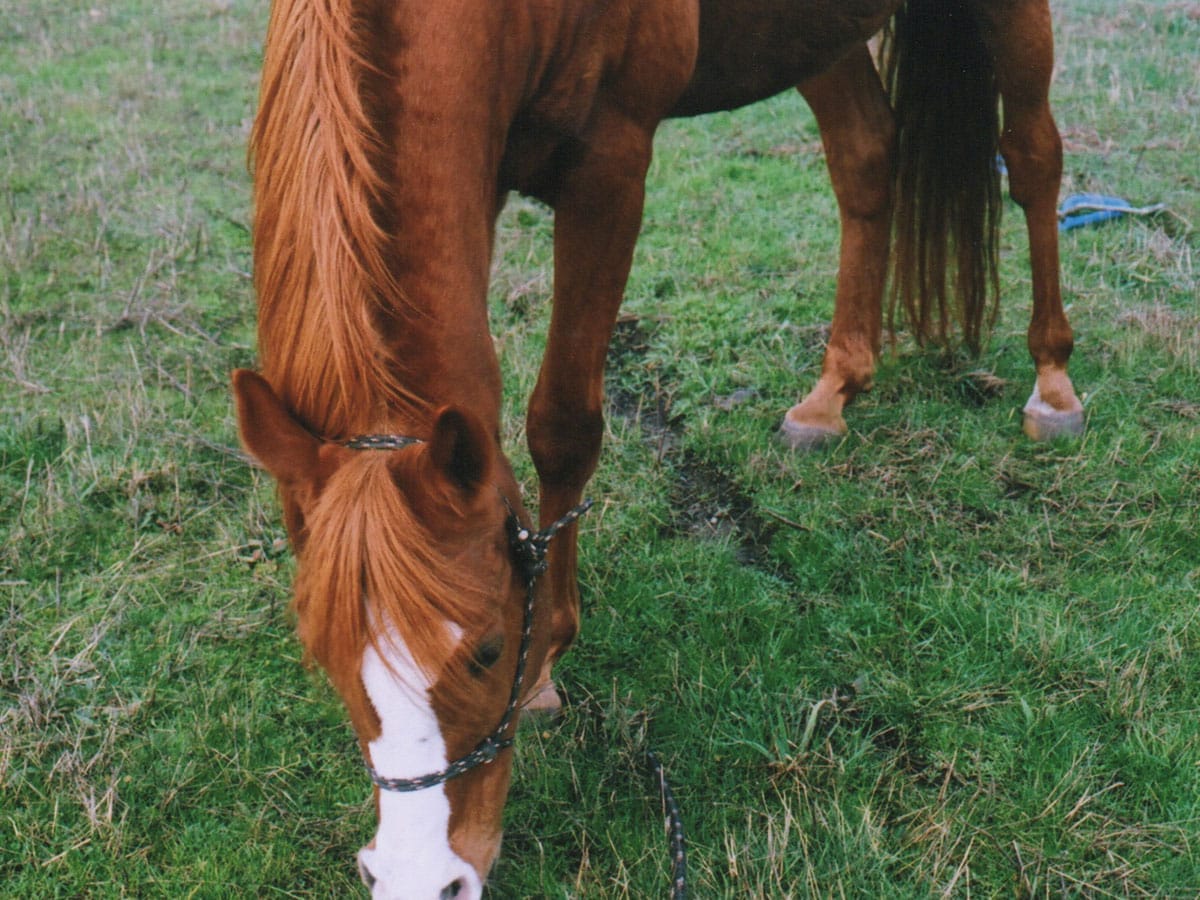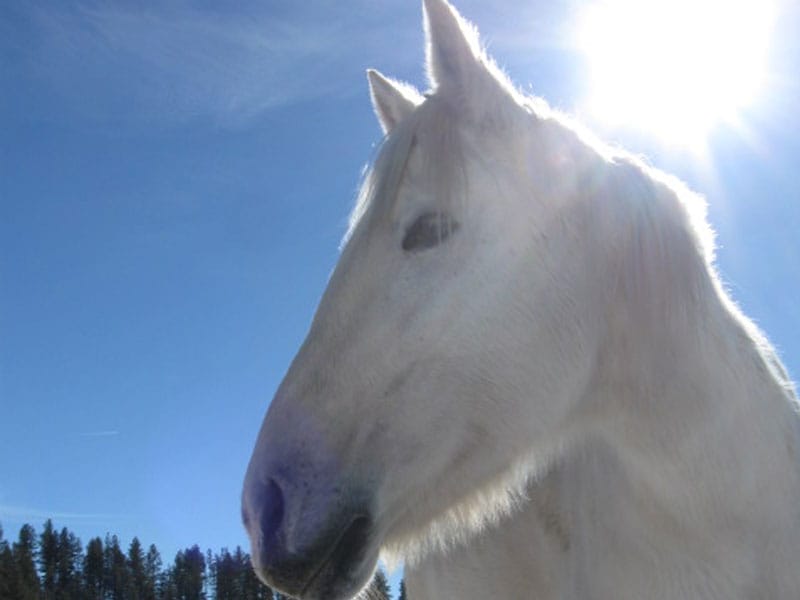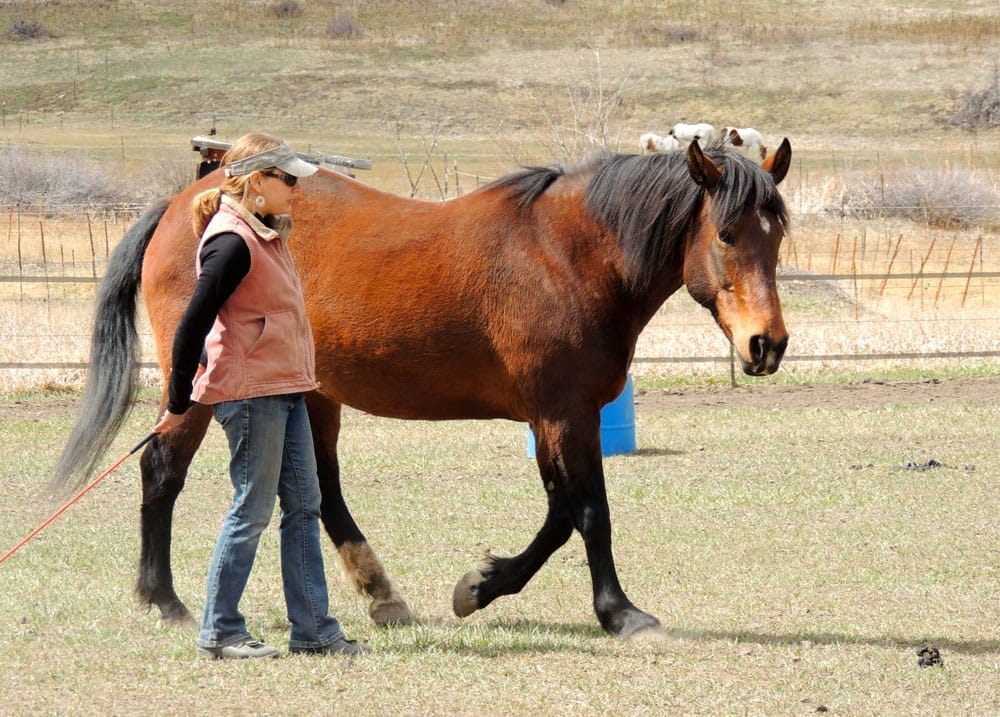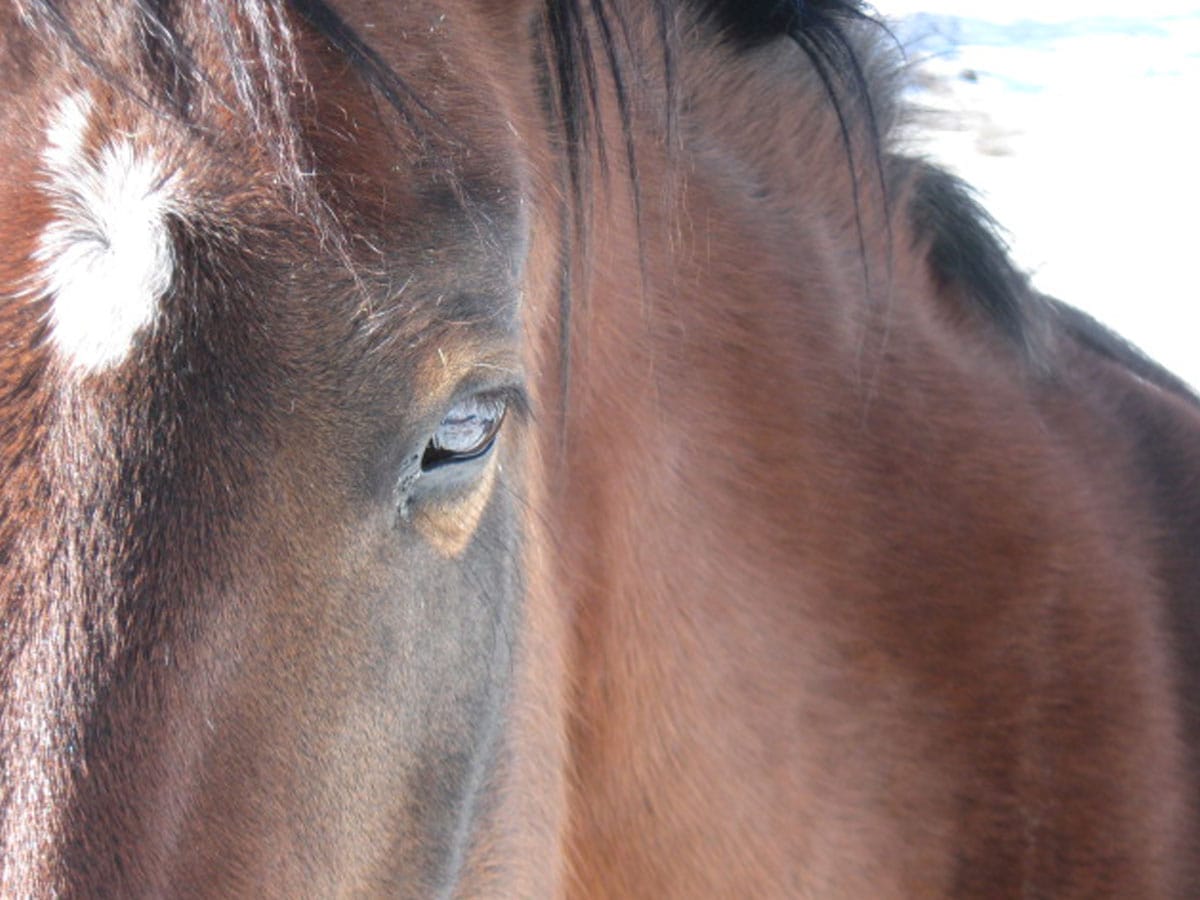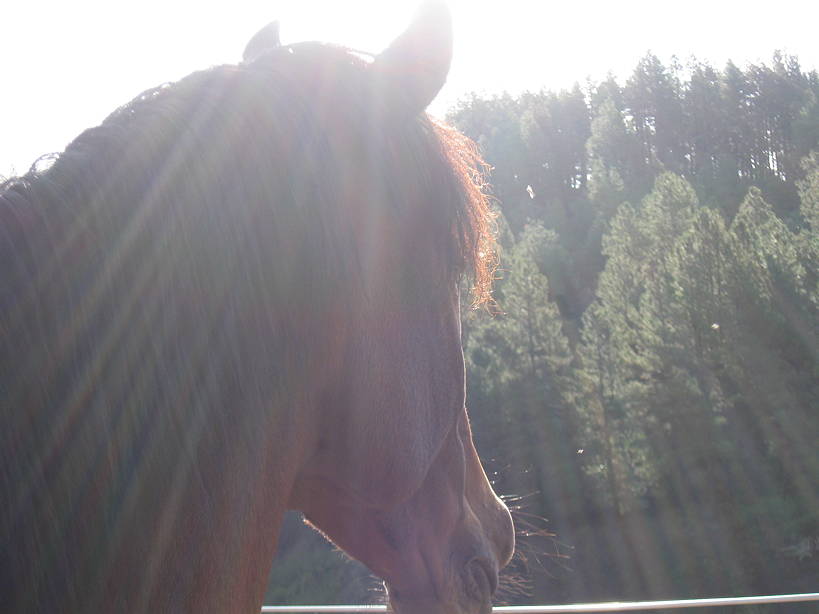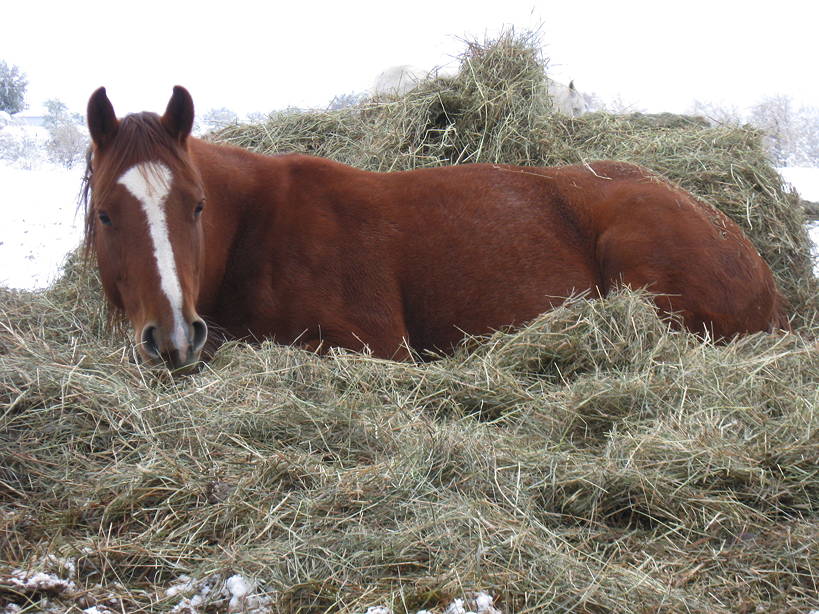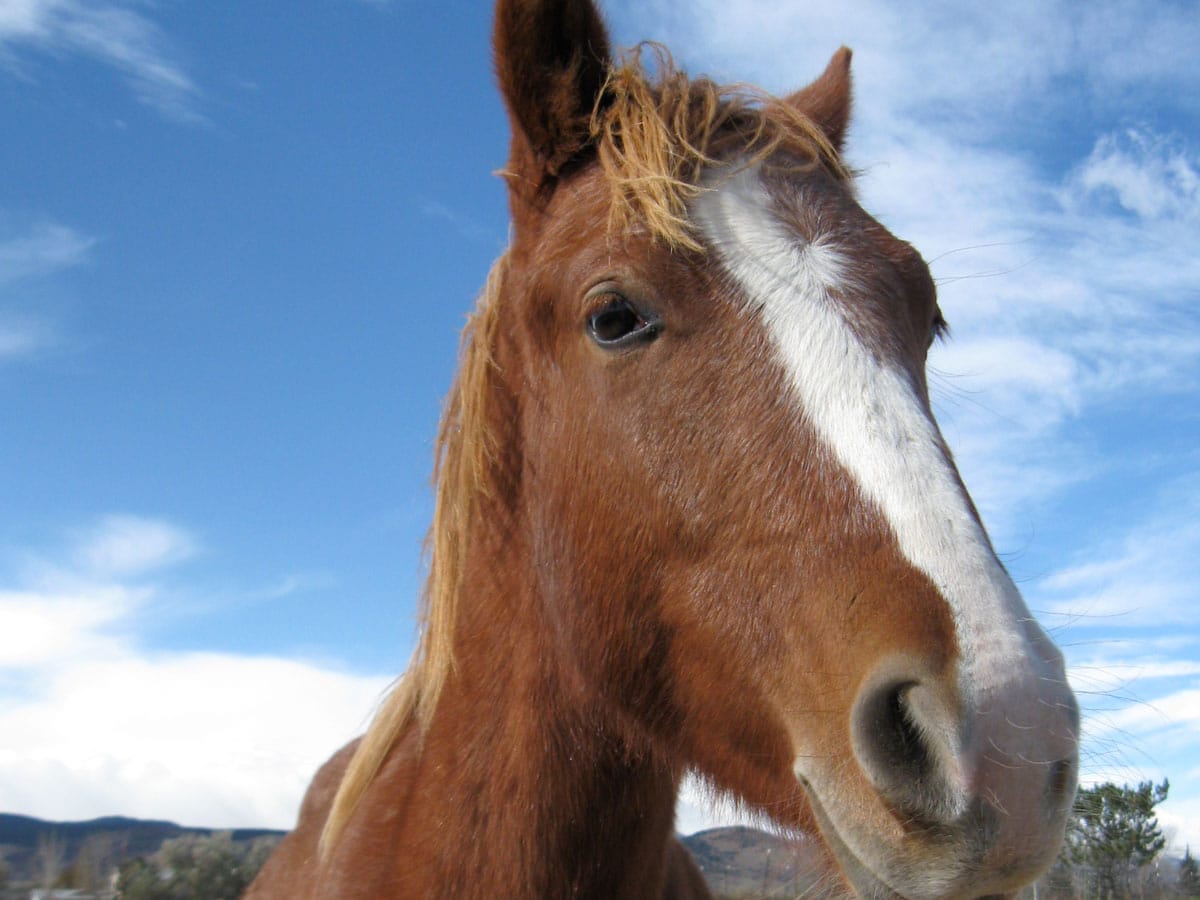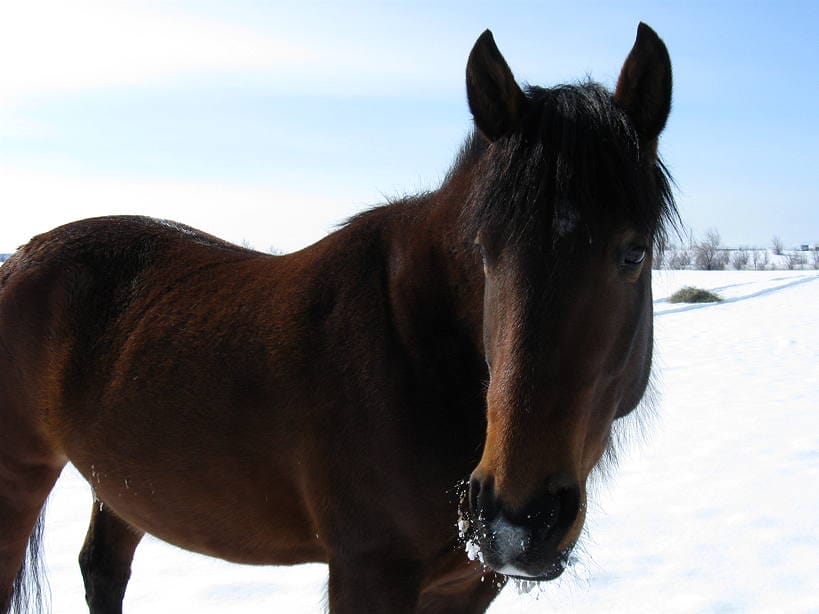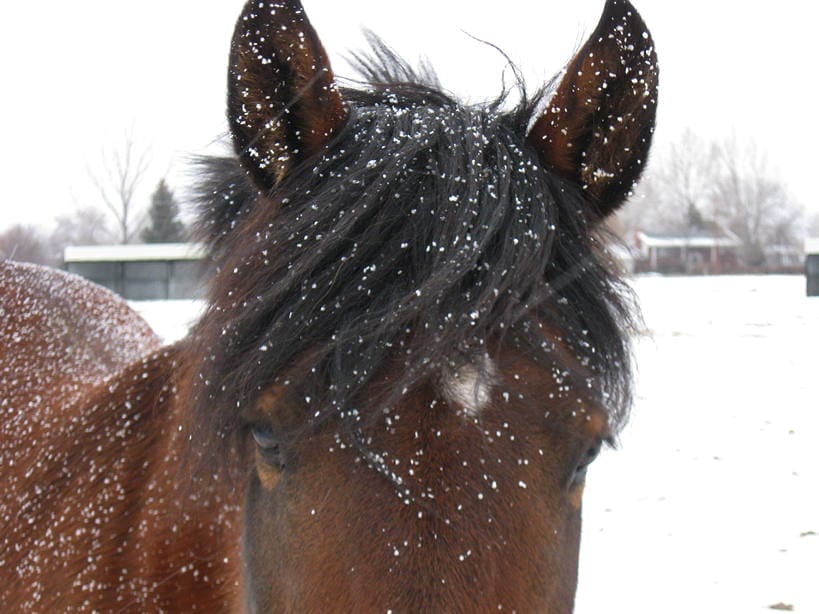In Memory, Cherokee the Mustang
In Memory, Cherokee the Mustang
Eleven years ago, when I first met Cherokee I went to touch her. She turned and walked away. Weeks later, my husband asked about the big and powerful brown horse out in the herd.
I said, “Her? Yeah that’s Cherokee the mustang. She won’t let anybody catch her.” Which was the truth. She was the least tame horse on the ranch.
Weeks after that, my co-worker and friend said, “You should do some of the new horse training techniques you’re learning with Cherokee. I think you two would get along.”
I stood in the pen the next morning with little chance of getting a hand on the coppery, stout bay mustang. But, she watched. She listened. Her skin flinched when I looked at it from fifteen feet away. She moved off the slightest pressure.
In the horse world we call this responsive. Then she began to follow me. I knew in an instant she was the most sensitive horse I had ever met. She was obliging my requests, but it was not because she was willing. I saw right away how wise, how clever, and how horribly wounded this mare was.
She was responsive because of fear. There was a brilliant innate sensitivity that had been corrupted by terror of humans. She carried this terror as rock solid tension in every taught muscle in her body. I could barely read her breath for how frozen in fear, ready to bolt in an instant, she was. Her self-preservation was on high alert and she was determined to survive.
The Lead Mare
In a natural setting, with her horse friends in the pasture she emanated a relaxed, powerful, palpable sphere of authority and confidence. Cherokee had real swagger. That mustang was cool as cool could be and she knew it. I don’t know if I’ll ever meet another spirit with such quiet, confident bravado.
As the lead mare in a herd of sixteen horses, her leadership was rarely questioned. She told who when to eat and in what order. She decided when it was nap time and when it was social hour. Cherokee lead with benevolence, rarely ever physically exerting her dominance. All it took was a look from her and the other horses listened. It was riveting to watch.
That morning, she followed me around the pen for five minutes and it was the most amazing feeling. She followed not because she liked me or thought me worthy. She followed because she knew that if she was behind me I couldn’t touch her. She tracked every footstep of mine. That was astounding to me. Crazy as it sounds, I fell in love. If I could get that intelligence to trust me and get that confidence to bridge to the human world, boy what a life we’d have together.
And, what a life we did have together. She did come to trust me slowly and entirely, over the years, until I could do anything with her, anything but ride her. That part she always kept for herself. And, like I said when I committed to bring her into the family, I was okay with that. I admit that for quite awhile I wasn’t always okay with it. I exhausted myself and my resources for many years trying to convince her to be a riding horse, but in her last years I finally came to terms with how it was. My contract with Cherokee was not about riding and going places. It was about dancing and knowing lightness of feel, whispers of the heart.
She came to trust all humans, vets and farriers included, and that, ultimately was my goal. Her fear of domesticated life had put her own life in jeopardy. I wanted to know that she would be able to receive routine and emergency care if I couldn’t be there. This happened and I’m grateful.
Her transformation marveled everyone she met. I couldn’t have fully rehabilitated her without the help of an awesome, patient team of family and caregivers over the years. For them, I am grateful.
For the rest of my life, I will never take for granted a horse that lets me ride on her back, load her in a trailer, trim her feet, and any do other things a domesticated horse needs to do. I understand how much horses have to trust to override the natural instincts that a wild horse is born with.
Synchronicities
There were a lot of synchronicities in my life with Cherokee. We didn’t know her history in the beginning, only that she was a mustang. I expressed my random hope that she’d come from a herd in New Mexico.
We met Cherokee while living at Colorado Horse Rescue. I spent a year and countless hours building a relationship with her. Then she was abruptly court ordered back to the abusive owners she’d been rescued from. I was devastated but determined. I contacted the owners and was able to buy her. After three hours of trying to get her on a trailer I’d borrowed from a friend, she got on and we brought her home. If she never would have had to go back to the owners, I never would have gotten her original paperwork. I never would have learned that she was in fact from New Mexico.
We made a pilgrimage to see Cherokee’s herd in New Mexico and visited nearby Pagosa Springs for the first time during that trip. A couple years later, we came back to Pagosa Springs for a Parelli Natural Horsemanship clinic. We fell in love with the little town. If Cherokee wouldn’t have been such a challenging horse to train, I might never have made the significant investment to attend the two week clinic with her and we might never have discovered our current home.
A few months after the clinic we bought property in Pagosa Springs and started our move. Cherokee then spent the last eight years of her life living within a couple hours of where she’d been born, in very much the same type of terrain. I swear she knew she was back home. She settled right in here. So much in her relaxed. Her swagger remained but her demeanor softened.
My First Horse
Cherokee was my first horse. Nearly everyone thought that someone as green as me shouldn’t have a horse as dangerous as her. And, well, they were right. It was probably the most foolhardy thing I’ve ever done. I’m lucky we both made it through so many blowups and wrecks unscathed.
Two weeks after we bought her, she and I were in a clinic to get the help I so sorely knew I needed. Cherokee spooked at some hanging plastic bags. In sheer panic, she bolted. She pulled the rope out of my hands, jumped a five and a half foot fence, and ran a mile off into the neighborhood. It was one of the most humiliating, terrifying and crushing experiences of my life. This horse I loved so dearly seemed so impossible to gentle.
Over the years, I hired at least ten trainers to work with her. All but one refused to ride her. He got eleven rides on her before he moved and we moved, and her transformation into riding horse never fully materialized. She bucked me off a couple times after that when I tried to ride her on my own. Then, she developed arthritis in her front hooves and needed to be retired. I’ll never doubt that we gave it our best try.
The Gentle Teacher
Either way, she put up with a lot of nonsense; pool noodles, tarps, plastic bags, jumps, barrels, balls, saddles, and ropes. You name it. She saw it. And slowly she stopped fearing every errant sound, every unfamiliar movement. Eventually she became that been there, done that kind of horse. The confidence that was the core of this lion-hearted mustang pushed its way through the layers of fear and into domesticated life.
I had my own fear to tackle in our time together. So, so much was transmuted. And to say this mustang taught me multitudes about horsemanship and horse behavior would be the grossest understatement of the century. I don’t even know how to begin to describe how much knowledge and skill I developed in the thousands of hours I spent learning while training that horse.
We completed the highest level of groundwork possible as amateurs, she performed successfully in front of a crowd in a big arena, and she worked with my clients as a wise therapy horse. Cherokee gently mentored my nieces and nephews in safe horse handling and helped my friend’s young autistic son find new avenues to self awareness. The dangerous horse became the gentle teacher.
She was brilliant at liberty work with no halters or ropes. She and I would dance together, free in the pasture. It was a dream come true.
In the end, Cherokee was the horse in my herd that came eagerly when I called her. That was the most precious gift, that she sought me out and wanted to be with me.
Mustang in the Truest Sense
Cherokee was a mustang in the truest sense of the word. When I met her I felt she was one of the strongest, fiercest, most complete and wild souls I’d ever met. I couldn’t fathom how she could be both totally intact and shattered, courageous and fearful, confident and insecure, entirely beautiful and broken yet unbreakable. In her lifetime, I never knew the full mystery of this beast.
She changed my life, but, even more so, she changed me. It seems too that, at least in part, I returned the favor. Eventually, the waves of fear subsided until the storm disappeared on the horizon. In time, the fragments found their way back to her or she found them.
The fact that she even wanted to become whole again, that she even wanted to live a content, comfortable life brings me such hope, such joy. She could have kept the walls up, but instead she was willing to become my companion, a family member, and a horse that helped humans heal. Her heart was so much more vast than I could imagine.
The fact that she could forgive and heal gives me an undying, unyielding hope.
So many obstacles seemed like they would prevent our becoming. Because of her unyielding spirit, none of them won. What won was love, hope, and happiness. Because of this life together, I too now know the wild and free way. I’ve, with her help, leapt over the barriers of fear and judgement and run back home.
What it Means to Be Free
I used to think that to be wild and free meant to leave, to be isolated and detached. I now know it is to be loving and be loved, to let nothing get between me and love.
That same wild spirit that made her untouchable, allowed her and I to touch the infinite. The same wild spirit that made her untamed, allowed us to tame the impulses that barred the way to our true nature. That same wild spirit that made her unbreakable, allowed us to break open our hearts, to break open the way to patience, compassion and contentment. In the end, nothing could hold the way from us. Nothing could keep us from a peaceful, fulfilled love together.
On her last morning, she did her classic downward facing dog bow for breakfast right at my feet. It didn’t escape me that she was bowing to me, saying thank you. I bow to you sister and all that you gave and all that you are. Thank you for the grand opportunity of this life together.
Now she rests in a valley at home where she found happiness and lived out her days. She slowed down considerably in her old age and was stoic through all the pains in her weary body, but was the leader until the end. She was surrounded by her family and herd and passed in an instant, bolting in her spirit body to a new found level of freedom. Yours is the infinite now my dear.
Miss Cherokee taught me all that I share in this writing and more. I had a friend once ask me if my next book was to be about Cherokee. This mare obviously is worthy of a whole host of tomes. I clearly could fill volumes.
Still I would never be able to say how full my heart is as a result of allowing one beautiful, bold, powerful and magnificent mustang touch, tame and break it.
[ngg src=”galleries” ids=”3″ display=”basic_slideshow” pauseonhover=”0″ arrows=”1″ transition_style=”slide”]
About Author, Stacey L. L. Couch
 Stacey L. L. Couch, Certified Shamanic Practitioner, works as a publicist and journalist for Mother Nature and is the author of Gracious Wild: A Shamanic Journey with Hawks. She empowers people with the ability to explore life’s big questions by calling on nature, story and synchronicity as a source for guidance and healing. With her deeply rooted experience in the field of shamanism and passion for working with wildlife and rescue animals, Stacey has a unique blend of rational and mystical perspective that makes the world of symbolism easily accessible to others. She values mindfulness, wonder, and compassion in her daily spiritual practice. Learn More about Stacey.
Stacey L. L. Couch, Certified Shamanic Practitioner, works as a publicist and journalist for Mother Nature and is the author of Gracious Wild: A Shamanic Journey with Hawks. She empowers people with the ability to explore life’s big questions by calling on nature, story and synchronicity as a source for guidance and healing. With her deeply rooted experience in the field of shamanism and passion for working with wildlife and rescue animals, Stacey has a unique blend of rational and mystical perspective that makes the world of symbolism easily accessible to others. She values mindfulness, wonder, and compassion in her daily spiritual practice. Learn More about Stacey.
